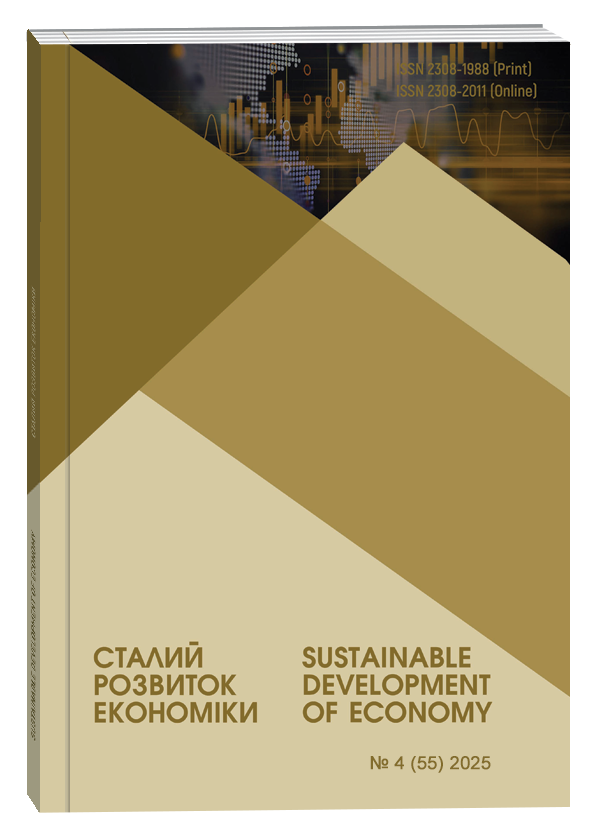ЕКОНОМІЧНИЙ ПІДХІД ДО МОДЕЛЮВАННЯ ОПТИМАЛЬНОЇ СТРАТЕГІЇ ЖИТТЯ
Анотація
У даній статті розглядається економічна проблема ефективного управління вартістю людського капіталу та загального рівня задоволення від життя економічного агента шляхом оптимізації вибору його рівня зусиль та рівня освіти в залежності від його здібностей. Кожна людина (економічний агент) прагне так управляти своїм життям, щоб отримати від життя максимальне задоволення, що виражається як приведене значення задоволення економічного агента від його рівня споживання впродовж життя з врахуванням певного рівня дискомфорту (незадоволення) від прикладених ним зусиль. У роботі продемонстровано, як з допомогою чисельних методів оптимізації можна вирішувати складні задачі динамічного програмування, що відповідають широкому спектру економічних задач, пов’язаних з вирішенням проблем оптимальної економічної поведінки людей на тривалих горизонтах з врахуванням їх здібностей, досвіду та прикладених зусиль.
Посилання
Stokey N., Lucas R., Prescott E. (1989) Recursive Methods in Economic Dynamics Cambridge, MA: Harvard University Press. URL: https://groupdocs.vip/look-up/gA02DE/603420/4982160-recursive-methods-in-economic-dynamics
Fan X., Seshadri А., Taber С. (2024) Estimation of a Life Cycle Model with Human Capital, Labour Supply, and Retirement. Journal of Political Economy, vol. 132(1), pp. 48-95. DOI: https://doi.org/10.1086/726232
Deming D., Silliman M. (2025) Skills and Human Capital in the Labor Market. Handbook of Labor Economics, vol. 6, pp. 115-152. DOI: https://doi.org/10.3386/w32908
Hai, R., Heckman, J. (2017) Inequality in Human Capital and Endogenous Credit Constraints. Review of Economic Dynamics, vol. 25, pp. 4-36, DOI: https://doi.org/10.1016/j.red.2017.01.001
Papageorge N., Thom, K. (2018) Genes, Education, and Labor Market Outcomes: Evidence from the Health and Retirement Study. Journal of the European Economic Association, vol. 18(3), pp. 1351-1399. DOI: https://doi.org/10.3386/w25114
Cunha F., Heckman J. (2009) The Economics and Psychology of Inequality and Human Development. Journal of the European Economic Association, vol. 7(2-3), pp. 320-364. DOI: https://doi.org/10.1162/JEEA.2009.7.2-3.320
Heckman J., Stixrud J., Urzua S. (2006) The Effects of Cognitive and Noncognitive Abilities on Labor Market Outcomes and Social Behavior. Journal of Labor Economics, vol. 24, № 3. DOI: https://doi.org/10.1086/504455
Pastorino E. (2024) Careers in Firms: The Role of Learning about Ability and Human Capital Acquisition. Journal of Political Economy, vol. 132 (6). DOI: https://doi.org/10.1086/728454
Greiner A. (2008) An economic model of work related stress. Journal of Economic Behavior & Organization, vol. 66(2), pp. 335–346. DOI: https://doi.org/10.1016/j.jebo.2006.12.001/
Aghion, P., Bergeaud, A., Blundell, R., Griffith, R. (2023) Social Skills and the Individual Wage Growth of Less Educated Workers. IZA Discussion Paper No. 16456. URL: https://www.iza.org/publications/dp/16456/social-skills-and-the-individual-wage-growth-of-less-educated-workers
Stokey N., Lucas R., Prescott E. (1989) Recursive Methods in Economic Dynamics Cambridge, MA: Harvard University Press. Available at: https://groupdocs.vip/look-up/gA02DE/603420/4982160-recursive-methods-in-economic-dynamics
Fan X., Seshadri А., Taber С. (2024) Estimation of a Life Cycle Model with Human Capital, Labour Supply, and Retirement. Journal of Political Economy, vol. 132(1), pp. 48-95. DOI: https://doi.org/10.1086/726232
Deming D., Silliman M. (2025) Skills and Human Capital in the Labor Market. Handbook of Labor Economics, vol. 6, pp. 115-152. DOI: https://doi.org/10.3386/w32908
Hai, R., Heckman, J. (2017) Inequality in Human Capital and Endogenous Credit Constraints. Review of Economic Dynamics, vol. 25, pp. 4-36, DOI: https://doi.org/10.1016/j.red.2017.01.001
Papageorge N., Thom, K. (2018) Genes, Education, and Labor Market Outcomes: Evidence from the Health and Retirement Study. Journal of the European Economic Association, vol. 18(3), pp. 1351-1399. DOI: https://doi.org/10.3386/w25114
Cunha F., Heckman J. (2009) The Economics and Psychology of Inequality and Human Development. Journal of the European Economic Association, vol. 7(2-3), pp. 320-364. DOI: https://doi.org/10.1162/JEEA.2009.7.2-3.320
Heckman J., Stixrud J., Urzua S. (2006) The Effects of Cognitive and Noncognitive Abilities on Labor Market Outcomes and Social Behavior. Journal of Labor Economics, vol. 24, № 3. DOI: https://doi.org/10.1086/504455
Pastorino E. (2024) Careers in Firms: The Role of Learning about Ability and Human Capital Acquisition. Journal of Political Economy, vol. 132 (6). DOI: https://doi.org/10.1086/728454
Greiner A. (2008) An economic model of work related stress. Journal of Economic Behavior & Organization, vol. 66(2), pp. 335–346. DOI: https://doi.org/10.1016/j.jebo.2006.12.001/
Aghion, P., Bergeaud, A., Blundell, R., Griffith, R. (2023) Social Skills and the Individual Wage Growth of Less Educated Workers. IZA Discussion Paper No. 16456. Available at: https://www.iza.org/publications/dp/16456/social-skills-and-the-individual-wage-growth-of-less-educated-workers


